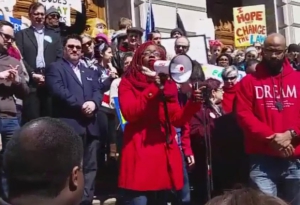On March 28, thousands took to the streets of Indiana, marching from Monument Circle to the the lawn of the State House in support of LGBTQ equality. Similar, spontaneous protests occurred in cities across the country this week.
Indiana is the 20th state to pass some type of so-called “religious freedom” legislation that specifically discriminate against LGBTQ people as well as other oppressed communities. All of these nearly 100 state laws make the following unconstitutional claim: LGBTQ people—or anyone—judged to be “religiously offensive” or “personally objectionable” should not be legally protected by either the state or federal government.
Under these recent “Religious Freedom Restoration” laws, individual business owners get to decide who and what they find “offensive” and “personally objectionable.”

“The same language being used today to exclude gay, lesbian, transgender (and bisexual people) has been used to exclude people in the past,” said Rabbi Beth Schwartz in Columbus, Ga. “It has been used to exclude people because of their religion, the color of their skin, their ethnic background. And every time they have been proved wrong.” This week, both state senates in Georgia and Arkansas voted to pass similar “anti-LGBTQ “restoration” bills.
On March 26, Gov. Mike Pence signed his law into effect, but within two days nationwide boycotts and protests had erupted in Indiana and across the country. Now, anti-LGBTQ discrimination laws have become a 2016 presidential campaign issue—really an opportunity to spew homophobic rhetoric during the campaigns.
“People aren’t going to see this [law] as discriminatory at all,” said presidential candidate Jeb Bush. “Governor Pence has done the right thing. Florida has a law like this. Bill Clinton signed a law like this at the federal level. This is simply allowing people of faith space to be able to express their beliefs, to be able to be people of conscience.”
Unfortunately candidate Bush’s claims, like the claims made in these laws, are a lie. “Religious Freedom Restoration” laws allege that “extra protections are immediately necessary in order for individuals to freely exercise their religion.” In reality, however, these laws are an attempt to nullify existing or future state and federal law protecting LGBTQ people and other oppressed communities.
By the end of June, the U.S. Supreme Court is expected to rule on the constitutionality of state bans on same-sex marriage. A ruling that the Fourteenth Amendment requires states to issue marriage licenses to same-sex couples and to recognize same-sex marriages performed out of state would mean nationwide marriage equality. This would provide necessary and immediate legal protection for LGBTQ couples across the country. Despite tremendous recent progress in overturning state bans, which has dramatically increased the number of states in which same-sex couples can get married, there are still 13 states in which there is a standing ban, restrictions or pending court action. This could rapidly change based on the Supreme Court’s forthcoming decision.
However, history has shown that relying on the U.S. Supreme Court is not a winning strategy. Last year, corporations like Hobby Lobby and other businesses won their “legal right” to deny their employees health insurance coverage if it included contraception. Hobby Lobby claimed contraception violated their personal religious beliefs, and the federal justices found in Hobby Lobby’s favor. As a result of this ruling, women are currently denied affordable access to birth control and other services.
Working people continue to unite, organize and fight back. Their actions have even caught the attention of bourgeois politicians, CEOs and celebrities, who are now publicly denouncing these bigoted laws. “As long as anti-gay legislation exists in any state,” said Charles Barkley this week, “I strongly believe big events such as the Final Four and Super Bowl should not be held in those states’ cities.”
Laws protecting LGBTQ civil rights are continually under attack and must be constantly defended or they’ll be quickly overturned. Saturday’s street protests show how a vigilant and well-organized movement can defend and protect hard-won, progressive reforms.
Once public opinion turned against him, Indiana Governor Pence tried to defend his law, claiming that “many people of faith feel their religious liberty is under attack by government action.” But Pence was quick to add that he opposes adding or protecting “sexual orientation” under Indiana’s civil rights laws, because, he said, “That’s not on my agenda.” According to this governor, inanimate objects such as “businesses” and even “states” deserve to have their legal, civil rights protected, but actual living people do not.



